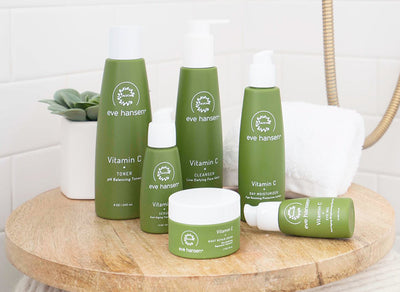
Vitamin C: An Overview
Vitamin C: The ingredient whose reputation precedes itself. The formula is simple: Vitamin C = Brighter + Tighter Skin! As an age old beauty secret, vitamin C is a tried and true solution for correcting the appearance of skin impurities and preventing further damage. This antioxidant powerhouse promotes healthy collagen production, helps to reduce inflammation and hyper-pigmentation, and brightens dull complexions.
We’ve all heard the Vitamin C skin-success stories but before we incorporate this ingredient into our skin care routine, we may have a few important questions such as: How do I use it? What skin types is it for? Are all forms of Vitamin C the same?
Not to worry – read on for a breakdown of all things Vitamin C!
Types of Vitamin C
Vitamin C is a staple in most skin care enthusiasts’ routines and, let’s be honest, it is totally justified. Still, with so many variations of vitamin c on product labels, it’s easy to lose track and become confused about which vitamin c derivative to use. Truly, not all vitamin c’s are created equal so it’s important to know the differences between them in order to make a decision about which one is right for you!
The most common forms of vitamin c found in beauty products on the market include:
- Ascorbic Acid (L-Ascorbic Acid)
- Sodium Ascorbyl Phosphate
- Ascorbyl Palmitate
- Sodium Ascorbate
- Magnesium Ascorbyl Phosphate (MAP)
- Ascorbyl Glucoside
- Ascorbyl Glucosamine

Ascorbic acid is most similar to the natural component of vitamin c already found in our skin and is therefore extremely effective in producing desired results. On the other hand, ascorbic acid is also the most irritating and rapidly oxidizing depending on how it is formulated. Those with more sensitive and dryer skin types could choose a more stable and less irritating Vitamin C derivative such as sodium ascorbyl phosphate or ascorbyl palmitate.
Other natural ways of incorporating vitamin c into your skin care regimen include keeping an eye out for fruit extracts and oils that are rich in vitamin c such as rosehip oil, spinach, lemon oil, blueberries, oranges, avocados, and more!
Morning Vs. Evening Vitamin C Benefits
In an earlier blog post, we discussed the importance of creating a unique morning and evening skin care routine because your skin has different needs during different times of the day. Vitamin C, however, is an ingredient that can be used both in the morning and at night and has unique skin benefits depending on the time of day it is used.
Vitamin C is a must in your morning routine because of its instantaneous results. It is immediately brightening and skin smoothing and it’s an easy addition to any busy morning schedule. Additionally, vitamin C is able to neutralize free radicals and has photoprotective properties that are necessary to correct existing sun damage and keep skin protected against future damage.
The long-term benefits and deep reparative qualities of vitamin C are gained through evening application. While we sleep, our skin is most able to absorb topical treatments, and this is when our natural repair mechanisms work at full strength. Using vitamin C at night will ensure you are getting the most out of your serum as it will boost healthy collagen production, repair hyperpigmented complexions, dark spots, age spots, wrinkles, and fine lines. Moreover, UV damage continues for hours after you’ve left the sun. Using vitamin C in the evening helps skin combat post-sun damage and the antioxidants prepare skin to fight damage the next day.
Skin Types
All skin types can take advantage of a vitamin C serum and benefit from the appropriate derivative of Vitamin C. Normal and oilier skin types are typically able to handle the potency of ascorbic acid and can experience results with any form of Vitamin C. As previously mentioned, it is less irritating for those with dry and sensitive skin types to use a vitamin C derivative that includes ascorbyl phosphate, sodium, magnesium, or palmitate.


